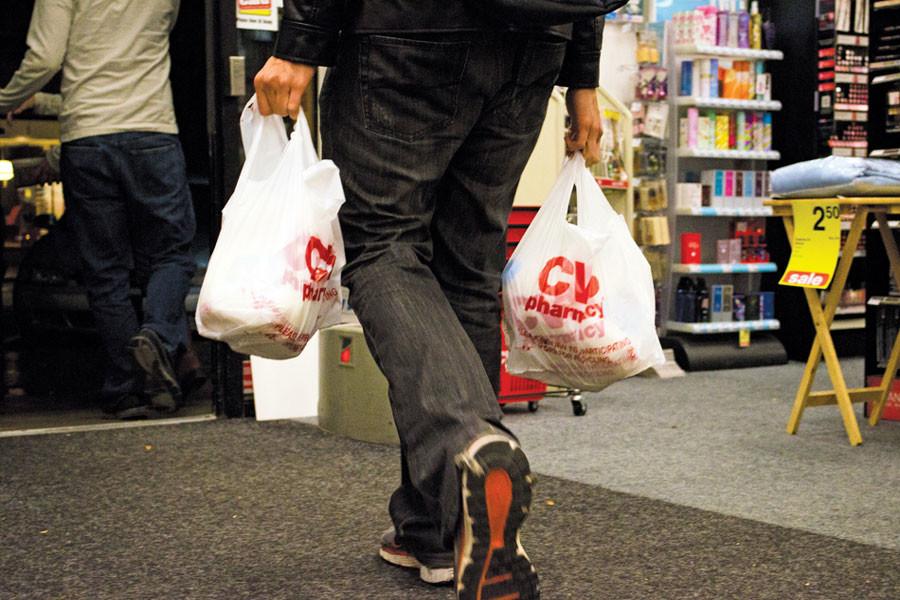Evanston proposes 10-cent tax on shopping bags to replace 2014 plastic bag ban
Daily file photo by Kaitlin Svabek
A man carries two plastic CVS bags out of the store. The Economic Development Committee approved a proposal for a 10-cent tax on shopping bags in late May, which would replace a 2014 ban on single-use plastic bags if approved by City Council.
June 23, 2022
Evanston is moving toward imposing a 10-cent tax on all shopping bags as part of its broader effort to increase sustainability after the Economic Development Committee approved a proposal in late May.
The new tax is a departure from the city’s 2014 ban of single-use plastic bags and applies to all plastic, paper and compostable bags. According to Evanston’s Sustainability and Resilience Coordinator Cara Pratt, many businesses circumvented the previous ban by using thicker plastic bags and classifying them as multi-use.
“With bans of specific materials, the result is often different types of bags that are not necessarily better for the environment,” Pratt said. “Instead of nudging people away from single-use bags, we want to encourage more reusable bags altogether.”
The city and the business would split the revenue from the new tax. The city’s half will go toward the Solid Waste Fund and other waste-related initiatives, according to a May 25 memo to the EDC.
Pratt and Mayor Daniel Biss met with leaders of the Citizens’ Climate Lobby Evanston North Shore Chapter in early June to discuss the tax. Erik Doeff, the chapter’s co-leader, said he supports the tax, as it puts a price on materials that are harmful to the environment.
“The bag issue is good to start with because it’s so tangible,” Doeff said. “You don’t have to retrofit your entire house, you just have to change your behavior around how you package your groceries.”
The tax proposal comes among a push by both city government and Evanston residents to ramp up efforts to restore climate stability. Updating the bag ban is part of the city’s goal to achieve zero waste by 2050, outlined in the Climate Action and Resilience Plan.
City Council passed a resolution declaring a climate emergency in Evanston on April 25.
Evanston’s Environment Board will work with Pratt to ensure the tax meets the city’s environmental goals. Cherie LeBlanc Fisher, the board’s co-chair, said the tax will make consumers realize using store-provided bags is not the only choice.
“If someone has to pay 10 cents at a store to get a plastic bag, that may make them think, ‘You know, this is a pain in the neck, maybe I’ll just bring my own bag next time,’” she said.
Chicago imposed a 7-cent tax on all paper and plastic shopping bags in 2017. A University of Chicago study found the tax led to a 28% decrease in the use of disposable bags within a year.
Pratt’s team, which includes Policy Coordinator Alison Leipsiger and Solid Waste Coordinator Brian Zimmerman, hope to hear from business owners and residents in meetings with the city’s business districts and possibly hosting town hall meetings.
Pratt said she hopes to get the proposal to City Council for final approval by the fall.
“We think that as a community we’re able to move forward and make this more aggressive,” Pratt said. “There’s enough ethos in Evanston around our waste reduction goals that we can make this happen.”
Email: [email protected]
Twitter: @saullpink
Related Stories:
— City’s plastic bag ban off to smooth start
— City council declares climate emergency in Evanston
— Zero waste general store brings sustainable shopping to Evanston


